Skip to comments.
Federalism or Teddy Roosevelt: You Can Only Pick One: Trump’s supporters should be careful not to saddle him with the legacy of a man who did everything to undermine the Constitution
American Greatness ^
| 04/13/2024
| Stephen Soukup
Posted on 04/13/2024 9:04:38 AM PDT by SeekAndFind
Over the course of the last week, some of President Trump’s most ardent and vocal online supporters have engaged in a bit of cognitive dissonance, praising the former president for his foresight and wisdom in calling for a federalist solution to one of the nation’s most intractable problems while simultaneously singing the praises of the one man who likely did more than any other American to crush the nation’s federalist history and culture.
Specifically, President Trump called for the question of abortion to be handled by the states, for the federal government to relinquish its power over the issue and enable government at a level closer to the people to enact their wishes. This solution is problematic for a variety of reasons, including, most notably, the Founders’ declaration that “Governments are instituted among Men” to secure the rights embodied in the “self-evident” truths “that all men are created equal, that they are endowed by their Creator with certain unalienable Rights, that among these are Life, Liberty and the pursuit of Happiness.”
That notwithstanding, Trump is almost certainly correct in arguing for a return to federalism to address many of the country’s most pressing and divisive issues. Not only was this the course agreed upon at the nation’s founding, but it also seems likely to be a sagacious solution to the ever-increasing threats posed by institutional “bigness”: Big Government, Big Business, Big Tech, Big Finance, etc. The growth of the federal state and the centralization of authority consequent to it—as well as the growth of other institutions that are empowered by the federal state’s reach—have been almost inarguably destructive to every aspect of the nation’s well-being.
As the great Russell Kirk put it, “All those gifts of variety, contrast, competition, communal pride and sympathetic association that characterize man at his manliest are menaced by the ascendancy of the omnicompetent state of modern times….”
It is ironic, then, that while Trump was out defending the virtues of federalism and while his supporters were praising him for doing so, many of those same supporters were also singing the praises of the nation’s 26th president, Theodore Roosevelt. While it is true that Roosevelt served in office as a Republican, that’s not to say that he was, in any way, a conservative. There is a reason, after all, that the above-mentioned Russell Kirk, who was born three months before Roosevelt died, is considered the “godfather of American conservatism.”
Conservatism as a coherent force did not really exist in American politics before the 1950s. Teddy Roosevelt, for his part, was, quite literally, a Progressive. His famous third-party run for the presidency in 1912 was under the banner of the Progressive Party. Temperamentally and ideologically, he had a great deal more in common with his distant cousin, Franklin, than he did with Ronald Reagan or any conservatives of the modern era.
In truth, Roosevelt is one of the three people in American politics most responsible for laying the foundation for the “omnicompetent” federal state—along with Woodrow Wilson and Herbert Croly.
When he was inaugurated, after the assassination and death of President McKinley, Roosevelt promised that he would “go slow” with his reform agenda—largely since no one had voted for it—but he couldn’t help himself. Within months, he was railing against “the rich,” complaining endlessly about “the trusts,” and insisting that it was his responsibility to fix the faults in the Founders’ Constitution.
In his first annual message to the nation, Roosevelt derided the Constitution and the federalism so prized by its framers, declaring that they had been woefully mistaken when they “accepted as a matter of course that the several States were the proper authorities to regulate, so far as was then necessary, the comparatively insignificant and strictly localized corporate bodies of the day.” He forgave the Founders personally (and ever so graciously) but nevertheless insisted that “The conditions today are wholly different” than they were in 1788, “and wholly different action is called for.” “The old laws and the old customs, which had almost the binding force of law,” he continued, were no longer sufficient “to regulate the accumulation and distribution of wealth.”
Most tellingly, he suggested that fate had empowered him to act on the people’s “sincere conviction that combination and concentration should be, not prohibited, but supervised and within reasonable limits controlled; and in my judgment, this conviction is right.” He insisted that he would, in other words, have to make himself—and the government more broadly—the partner of American business to see that the concentration of wealth was properly used to advance the general welfare.
These then are Teddy Roosevelt’s Progressive legacies: a belief in the inadequacy of the Constitution, a belief that government can and should be the arbiter of economic success (opening the door to corporatism), and the inauguration of the nation’s perpetual and ongoing class war, in which “the rich” and “the industrialists” (i.e., businessmen) are deemed enemies of the people.
It is worth noting that whatever one thinks of Roosevelt, his ideology, or his reforms, the necessity of his crusade was questionable at best. Despite the Panic of 1893 and the subsequent depression, the American Gross National Product (GNP) grew at a roughly 4.5% rate from 1890-1907. During much of the same period, the decade leading up to Roosevelt’s presidency, prices either remained flat or fell (1894, -3.7%; 1895, -3.8%). The “trusts” may have been a social and political issue for the nation but were hardly an economic concern. One would be hard-pressed to make the case that these so-called enemies of the people were enemies of anyone other than Roosevelt himself.
The ongoing fascination of some segments of the political right with Theodore Roosevelt is honestly quite baffling. The late Senator John McCain also idealized Roosevelt, aligning himself with the image of the “Bull Moose.” The Bull Moose, of course, was the official mascot of the Progressive Party, and the “Bull Moose Party” was just a nickname for the Progressives.
In short, President Trump’s supporters should be glad and pleased that their guy has embraced federalism, but they should also be careful not to saddle him with the legacy of a man who did everything in his power to undermine the Constitution and its federalist spirit. Not only are the positions at odds with one another, but the latter bodes ill for his endeavor to Make America Great Again.
TOPICS: Constitution/Conservatism; Culture/Society; Government; Philosophy
KEYWORDS: biggovernment; federalism; hh2; newnationalism; progressivism; statism; stephensoukup; theodoreroosevelt; tr
Navigation: use the links below to view more comments.
first previous 1-20 ... 41-60, 61-80, 81-100, 101-106 next last
To: ProgressingAmerica
One must read conservative commentary on the Progressive era with care. For the most part, the original Progressive movement by Republicans sought to address significant problems in American life. Wilsonian Progressivism was another matter entirely and was the animating force of American liberalism for a century.
As for Teddy Roosevelt's record, let us begin with anti-trust legislation. The worst business combines and trusts of the era engaged in bribery, extortion, sabotage, and highly destructive market manipulations. That is not capitalism but criminality.
As for the national park system, is that really an issue? Considering that the land was federally owned, Teddy Roosevelt dedicating choice parts for use as federal parks is plainly constitutional. Or do you think that the Louisiana Purchase and other national territorial acquisitions ought to be undone as unconstitutional?
Until Republican Progressive era reforms, it was an open and common practice for major corporations to deliver monthly satchels of cash to members of Congress. Even after being outlawed, the practice continued for many decades. The father of a friend had such a job as a bright law school graduate during the Depression.
Conservatism cannot prosper as a political philosophy if it cannot address problems and fashion remedies and reforms. This brings us to a paradox. As di Lampedusa offered in his great conservative novel The Leopard, "If we want everything to stay as it is, everything has to change." Conservatism at its best accepts the necessity of change so that what is essential remains alive and vital.
To: cowboyusa
"
I have always believed that it would also be necessary to give the National Government complete power over the organization and capitalization of all business concerns engaged in inter-State commerce." - T. Roosevelt
This ^^^ is NOT Hamiltonian.
The myth of "hamiltonian" and "jeffersonian" in our modern conception is rooted in Herbert Croly (mentioned above by the original author) in case you want to know where that nonsense originated from.
https://librivox.org/the-promise-of-american-life-herbert-croly/ Audio, or text for reading.
There's several chapters of it there, all of it will be familiar even though you've likely never read or listened to this work. That's because this is where it originates.
82
posted on
04/13/2024 9:17:29 PM PDT
by
ProgressingAmerica
(The historians must be stopped. They're destroying everything.)
To: Rockingham
“One must read conservative commentary on the Progressive era with care.”
I do not read conservative commentary on the Progressive era.
I go to the original sources, and I then create audio books out of this filth so its easier to spread around to people who confuse modern “conservative commentary” for enlightened thought on the matter.
Like this one:
https://librivox.org/the-promise-of-american-life-herbert-croly/
I can assure you, the progressives in the progressive era are even more rotten than any modern “conservative commentary” you have read will describe. Go ahead; read it, listen to it, all 18 and a half hours of it. You’ll see. There’s no confusion and there won’t be any on your part either.
Precious few of modern “conservative commentary” takes the time to show how progressives have been wrong for the last 120 years, so I have little time for them. That won’t be my last solo audio book. These progressives have survived and thrived for far too long by keeping themselves in the shadows. Now they’re on YouTube. https://www.youtube.com/watch?v=Dn2CjsB0ifk
If there’s one thing I ! DO !!! have it within my power to do, that’s to remove their shadows so they have nowhere to hide.
As for Teddy Roosevelt’s record, where we need to begin is price fixing. We should follow that up with the 16th/17th amendments. Perhaps let’s delve into his monarchist pen-and-phone attitude with the executive orders flowing from his kingly scepter. Let’s have a real discussion, and not this comfort food.
83
posted on
04/13/2024 9:33:20 PM PDT
by
ProgressingAmerica
(The historians must be stopped. They're destroying everything.)
Slight correction. This author did mention Herbert Croly, so I did read it.(this is rare) But in most instances, I’m not interested in someone who believes progressivism was born three years ago and thinks they’re hot stuff because they have a new fact they want to show off to people.
I do read much more original source material than generic commentary.
84
posted on
04/13/2024 9:39:20 PM PDT
by
ProgressingAmerica
(The historians must be stopped. They're destroying everything.)
To: Rockingham
Not my intent to spam you, so on that level let me offer a bit of an apology.
In any case, I posted this a few days ago. This is me, not reading any “conservative commentary” and instead going to the fountain.
How long ago did progressives start using American history to attack the Founding Fathers?
https://freerepublic.com/focus/f-chat/4229764/posts
I quote an original source, page 67, I do not have any need to rely on the commentariat who most of the time get it wrong.
85
posted on
04/13/2024 9:43:46 PM PDT
by
ProgressingAmerica
(The historians must be stopped. They're destroying everything.)
To: ProgressingAmerica
LOL, yes there's a lot, especially when taking in all four sites. And that is only the beginning.
Since you are interested in Progressivism, start with the Kelo piece, but once you are done with it, you'll probably wish to take in the first three articles of the series: On a Republic We Didn't Keep.
86
posted on
04/13/2024 10:14:58 PM PDT
by
Carry_Okie
(The tree of liberty needs a rope.)
To: x; ProgressingAmerica; MCF; Reily; Captain Jack Aubrey
x:
"Nixon went through the Depression and WWII.
People in that generation might be more accepting of big government than those of other generations."MCF #7: "IMHO, it was the 17th Amendment that really destroyed federalism."
progressingAmerica #39: "I agree, followed closely in its danger (in a different context) by the 16th Amendment.
Both of which (amendments) owe their existence to Theodore Roosevelt."
There were four candidates in 1912,
each more progressive than the next:
 Hmmmmm... I'm starting to understand that there is a serious bug up some people's hindquarters to paint Teddy Roosevelt with the same "Progressive" brush as Woodrow Wilson, and yet I'm most reluctant to grant that they were just two peas in the same Progressive pod.
Hmmmmm... I'm starting to understand that there is a serious bug up some people's hindquarters to paint Teddy Roosevelt with the same "Progressive" brush as Woodrow Wilson, and yet I'm most reluctant to grant that they were just two peas in the same Progressive pod.
So far as I can tell, it's just more work of Democrat devils saying: "oh, do you like trashing our hero Wilson? Well, then we'll just trash the h*ll out of your hero Teddy Roosevelt!!".
But the basic, fundamental, root problem with all this kind of nonsense is, people are looking at Teddy Roosevelt through the lens of Franklin Roosevelt and saying, in effect -- "because Franklin Roosevelt did 'Y', therefore, 'Y' is what Teddy Roosevelt intended by 'X' ".
I just don't buy that.
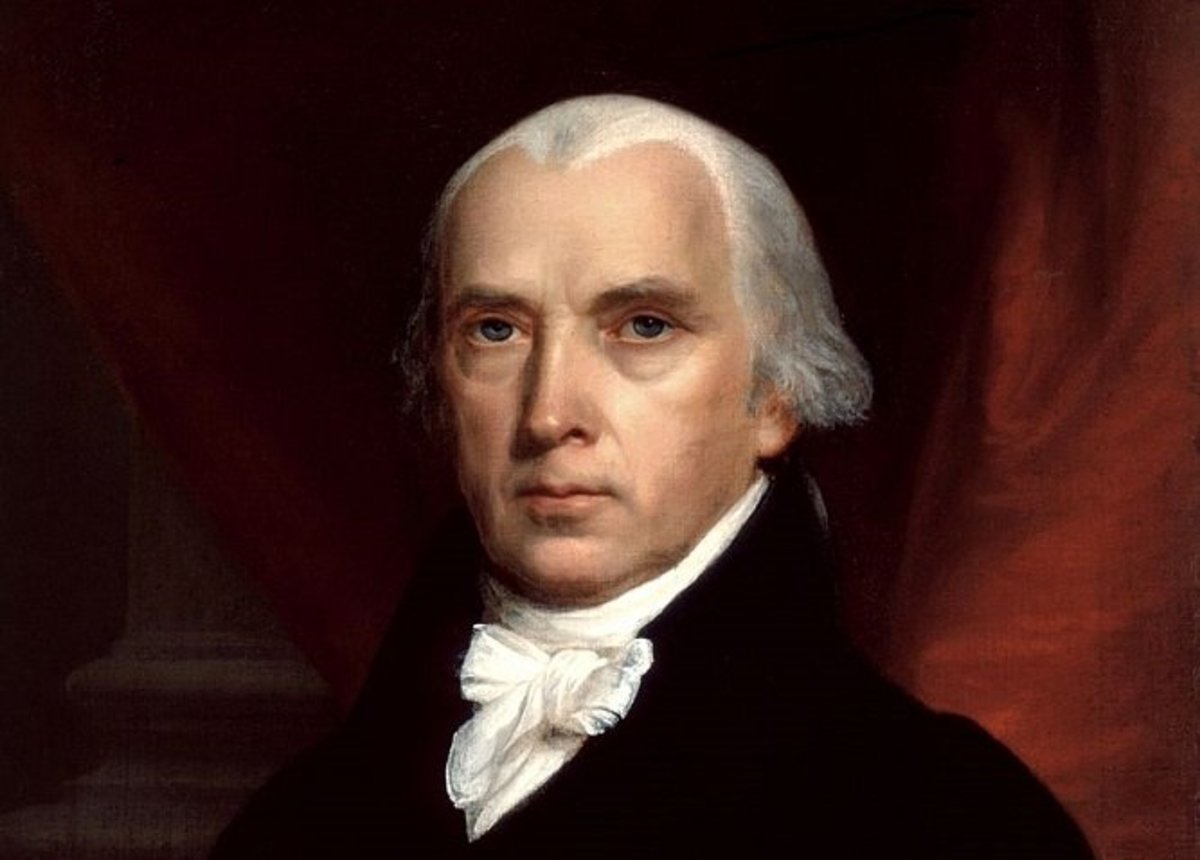 Take, for example, the 16th Amendment -- Federal income taxes, on this thread blamed on Teddy Roosevelt, and yet:
Take, for example, the 16th Amendment -- Federal income taxes, on this thread blamed on Teddy Roosevelt, and yet:
- An income tax was first proposed by a Democrat, the Father of the Constitution, Pres. James Madison as a temporary wartime measure during the War of 1812.
That war ended before Congress could pass the tax, but this pedigree suggests to me that an income tax was neither unknown nor abhorrent to our Founders and their Constitution.
- During the Civil War the Republican Congress enacted a temporary wartime income tax which raised around $100 million of the war's total $5 billion cost.
That tax ended in 1872 under Pres. Grant. - As early as 1880, just eight years after the Civil War income tax ended in 1872, political groups began advocating a new graduated income tax:
- 1880 the Greenback Party (aka National Independent Party) called for an income tax, 8-hour work day and women's suffrage.
- 1892 the Populist Party Omaha Platform called for, along with an 8-hour workday, direct election of US senators, pensions for former Union soldiers, nationalized railroads and elimination of private banks, also a graduated income tax.

- 1908 the Democrat Party platform also called for a graduated income tax and direct election of US senators.
- In 1912, Teddy Roosevelt's Progressive ("Bull Moose") Republicans supported the 16th Amendment, as did the other candidates, Wilson, Taft & Debs.
Roosevelt's support is listed as arising from his concerns about military threats posed by increasingly aggressive empires in Asia and Europe, producing a need for stronger US military forces.
In other words, TR saw income tax as a revenue source for a military necessary to maintain "peace through strength".
Which brings us to the question of, just how progressive were TR's Bull Moose Republicans and, whether they can be blamed for the explosion in Federal government powers and spending under TR's nephew-cousin -- Democrat President Franklin Roosevelt's New Deal?
Teddy Roosevelt's Great White Fleet:
 My answer is, I don't think TR could have imagined what FDR would do with the progressive reforms TR supported.
My answer is, I don't think TR could have imagined what FDR would do with the progressive reforms TR supported.
And a most curious aspect of this is that Franklin Roosevelt did not call himself a "progressive" but rather insisted he was a "liberal" -- with the distinction being "progressives" by the 1930s were considered ideologically anti-constitution, while FDR insisted that he & other "liberals" supported the Constitution, just needed to make some changes to help people suffering from the Great Depression.
In today's political landscape, among Democrats, 37% consider themselves to be "moderates" (i.e., Manchin), 51% call themselves "liberals" (i.e., Biden?) and 12% self-identify as the Progressive Left (i.e., AOC).
Bottom line:
This graph below is the problem with blaming Teddy Roosevelt in, say, 1908 for what Franklin Roosevelt and other Democrats did from the 1930s on.
Federal spending as a percentage of US GDP since 1790 (in 2023 = 22.4%):
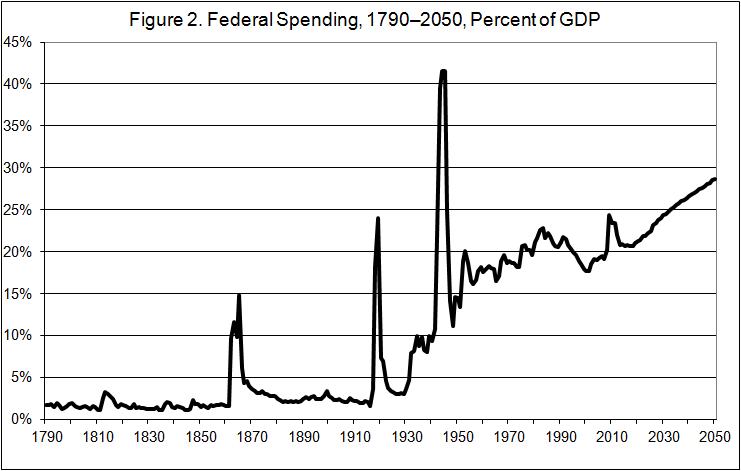
![]()
87
posted on
04/15/2024 10:09:15 AM PDT
by
BroJoeK
(future DDG 134 -- we remember)
To: BroJoeK; x; MCF; Reily; Captain Jack Aubrey
"
I'm starting to understand that there is a serious bug up some people's hindquarters to paint Teddy Roosevelt with the same "Progressive" brush as Woodrow Wilson"
Theodore Roosevelt founded the Progressive Party, the first major document in U.S. history that calls for a government takeover of healthcare. That is, universal healthcare to use modern lingo. Don't blame me for that though.
Since I'm such a nice guy, here is my recording of the 1912 platform of the Progressive Party, so you don't have to take time out of your busy day to go and read it. I did the hard part. You can do the easy part. See how nice that is?
https://librivox.org/short-nonfiction-collection-vol-091-by-various/
https://www.archive.org/download/snf091_2204_librivox/snf091_trooseveltplatform_progressiveparty_pa_128kb.mp3 (Direct mp3 download)
https://www.google.com/books/edition/The_Birth_of_the_New_Party/pwaIAAAAMAAJ?hl=en&gbpv=1&pg=PA303 (Text)
Oh, and Debs wasn't a progressive. He was a socialist. Next.
"So far as I can tell, it's just more work of Democrat devils saying: "oh, do you like trashing our hero Wilson? Well, then we'll just trash the h*ll out of your hero Teddy Roosevelt!!"."
I can see you didn't listen to the New Nationalism speech, which is something I had said everybody should do so they have more well rounded opinions. I don't understand why people like you put a guy up as your hero when you don't know a thing about his political beliefs and domestic record.
Here, go listen to it. Tell us how great it is.
https://www.youtube.com/watch?v=lzj9-cHMLwY
https://www.youtube.com/watch?v=hCtFyrisfvM
https://teachingamericanhistory.org/document/the-new-nationalism/
If you don't know his positions, you might do well to do more research before picking a hero.
Now, you've read(heard) the platform. Now, you've heard what he believed in The New Nationalism. You were saying?
88
posted on
04/15/2024 4:03:03 PM PDT
by
ProgressingAmerica
(The historians must be stopped. They're destroying everything.)
To: BroJoeK; x; MCF; Reily; Captain Jack Aubrey; Glad2bnuts; ebshumidors; nicollo; Kalam; IYAS9YAS; ...
"
So far as I can tell, it's just more work of Democrat devils saying: "oh, do you like trashing our hero Wilson? Well, then we'll just trash the h*ll out of your hero Teddy Roosevelt!!"."
I have no need to trash anybody. But I'd like to propose a hypothetical to you. Let's say I did want to trash the guy, what would that look like? Here's what I would do.
I would start out by talking about Theodore Roosevelt and eugenics. I would highlight the letter he wrote to notorious eugenist Charles B. Davenport. I would point out, that the direct MP3 audio for that letter can be found here, and also mention that this letter was on YouTube, one of the highest profile websites on the planet. https://www.youtube.com/watch?v=Kl33G84FDF0 Which, you know, makes it highly accessible for everybody.
But I wouldn't stop there. I would post an image of the letter he wrote to Davenport, so people could see that it is real, and see the letterhead on it with the publication date, like this:
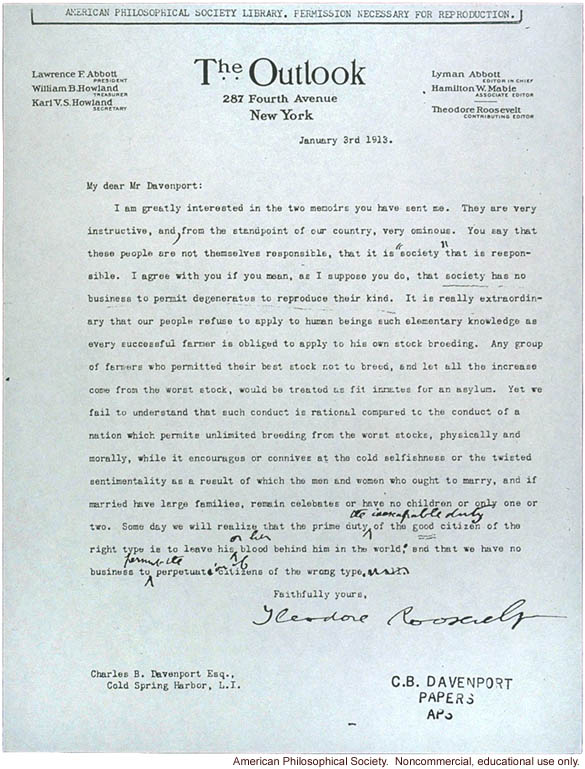
... followed by ending my post with the full text so that people can use their browsers to search the text in this window, also knowing that increases it showing up in generic search results. That is what I would do and how I would do it.
You know. Hypothetically speaking.
I am greatly interested in the two memoirs you have sent me. They are very instructive, and, from the standpoint of our country, very ominous. You say that these people are not themselves responsible, that it is "society" that is responsible. I agree with you if you mean, as I suppose you do, that society has no business to permit degenerates to reproduce their kind. It is really extraordinary that our people refuse to apply to human beings such elementary knowledge as every successful farmer is obliged to apply to his own stock breeding. Any group of farmers who permitted their best stock not to breed, and let all the increase come from the worst stock, would be treated as fit inmates for an asylum. Yet we fail to understand that such conduct is rational compared to the conduct of a nation which permits unlimited breeding from the worst stocks, physically and morally, while it encourages or connives at the cold selfishness or the twisted sentimentality as a result of which the men and women ought to marry, and if married have large families, remain celebates or have no children or only one or two. Some day we will realize that the prime duty - the inescapable duty - of the good citizen of the right type is to leave his or her blood behind him in the world; and that we have no business to permit the perpetuation of citizens of the wrong type. - Theodore Roosevelt
I've been at this against progressives for 15 years, writing about and recording the evils of progressivism to increase accessibility. It would be grossly negligent for me to exclude the guy who was the only presidential candidate for The Progressive Party. It might even be outright malpractice if I didn't even mention TR from time to time.
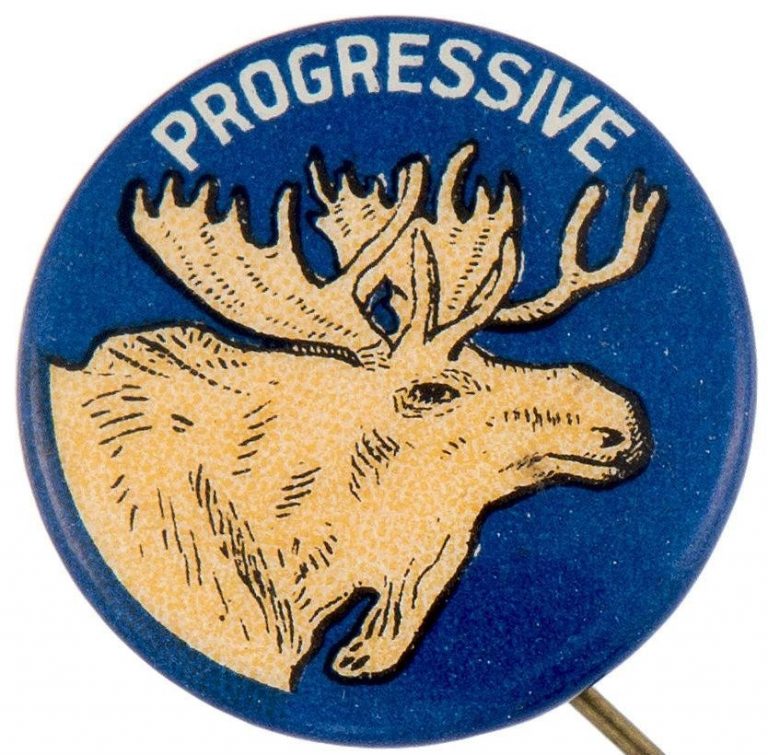
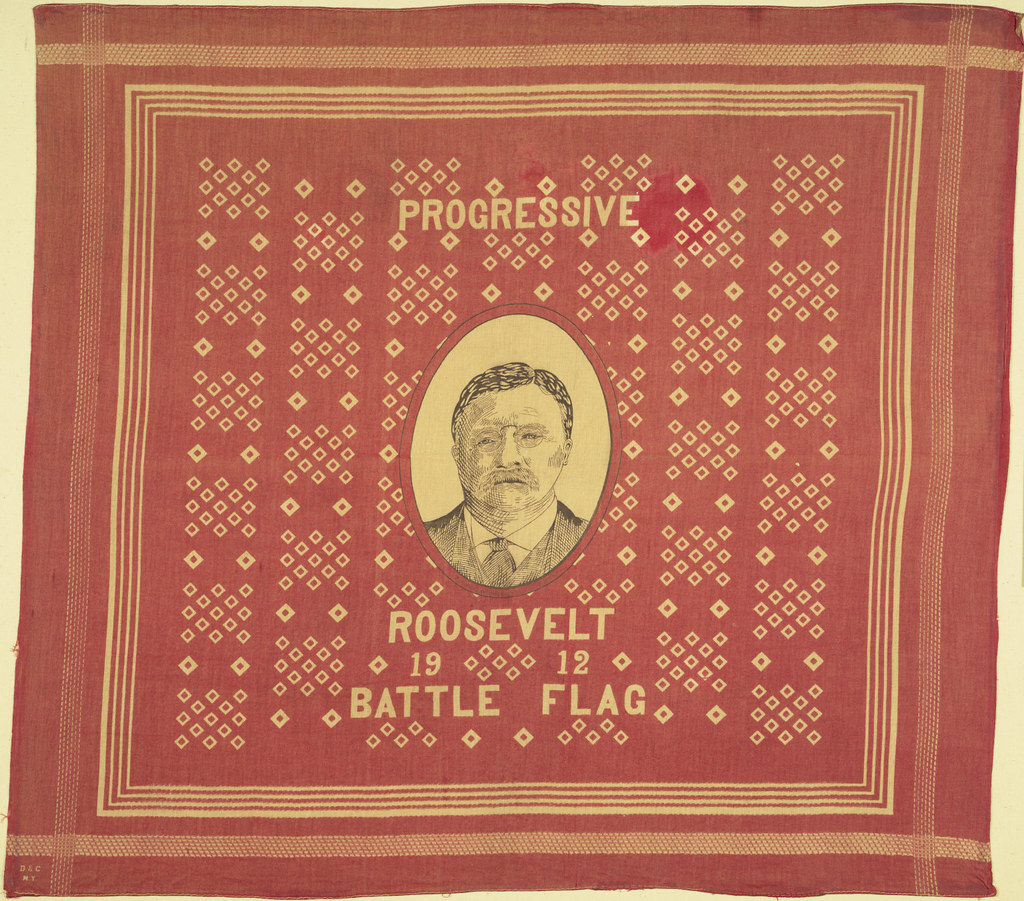
89
posted on
04/15/2024 5:13:53 PM PDT
by
ProgressingAmerica
(The historians must be stopped. They're destroying everything.)
To: ProgressingAmerica
I have a history degree and am familiar with Croly's book, with Charles Beard's 1913 book,
An Economic Interpretation of the Constitution of the United States, and with Walter Lippman's writings.
None of them has stood the test of time. Why though were they so influential in their day? Was it because Progressivism is so innately attractive a bundle of ideas that, like a potent narcotic, a few doses and the country was hooked? I think not.
The better line of historical analysis is to ask why Progressivism was so attractive to so many people in its originating era.
I think that Progressivism resonated with Americans as a political movement because it offered answers to problems that otherwise seemed insoluble. As Americans urbanized, they found that their teeming cities had a host of problems: crowded and dangerous tenements; a lack of clean water and sanitation; unhealthy drugs and adulterated food; alcoholism and opiate drugs; crooked politicians, law enforcement, and judges; rampant crime; corrupt business practices; and poor and exploitative working conditions in service to employers and industries that enjoyed great wealth.
The first generation of Progressivism identified these as problems and put forward solutions, often based on scientific and expert recommendations. There were building codes to assure safety and limit crowding; municipal water and sewer systems and waste disposal; restrictions on the serving of alcohol; new and higher taxes to finance public improvements and regulations to effectuate reforms; pure food and drug acts; anticorruption legislation; reforms like the direct election of US senators to get around the habitual corruption of state legislatures; and much else.
The opposition focused on constitutional arguments and had considerable success in court for many years. This in turn inspired anti-constitutional arguments and attitudes by later Progressives and an embrace of theories of history based on race and economic interests.
For some time, Teddy Roosevelt and Republican progressives coexisted in an uneasy truce with the conservative wing of the party. Sadly, Roosevelt and Taft split the GOP in 1912 and opened the way for Woodrow Wilson. That began the ascendancy of aggressive Leftist Progressivism.
To: ProgressingAmerica
It is hard to have to rethink people who have been presented to me as heroes, had aircraft carriers named after them, and had personal qualities I admired.
I always respected Richard Nixon-but it is hard for me to defend him for his economic policies (gold standard, price controls) so I have to square that circle sometimes. In his case, I will always respect him for his bombing Hanoi and mining of Haiphong harbor to bring the North Vietnamese Communists to the bargaining table.
But is a challenge for most of us to rethink certain people, but over the last 30 years, I have had to do just that with Theodore Roosevelt. I view him quite differently now than I did as recently as the Nineties.
91
posted on
04/16/2024 4:24:03 AM PDT
by
rlmorel
(In Today's Democrat America, The $5 Dollar Bill is the New $1 Dollar Bill.)
To: rlmorel
That’s going to continue to happen as more history gets brought to the forefront. There are people asking questions. Hopefully they’ll find the answers they’re seeking more quickly this way - I know that for me, my feeling is that ‘yes they will’. There are also those who will accidentally run into it and be a little shocked by what they didn’t learn in their Advanced Placement classes - because its more easily accessible.
I am still pushing through the J. Warren audio as time allows, and it continues to confirm for me about who I think the Founders are based on what I’ve found regarding certain quotes, but also what I wasn’t taught in educational rounds. Some sections I’ve listened to more than once, just because that’s how I do. The subsequent chapters can sometimes help reiterate the previous chapters or describe beliefs and events more fully through additional context.
To many Americans, that book will come across as shocking though. And quite frankly, they need to be shocked. That’s a good thing. The reverse is also true in the same way, if they can actually be convinced to take the time (or listen) to read a book like the one published by Croly or Wilson’s many works.
92
posted on
04/16/2024 9:41:04 AM PDT
by
ProgressingAmerica
(The historians must be stopped. They're destroying everything.)
To: Rockingham; DiogenesLamp; rlmorel; BroJoeK; x; MCF; Reily; Captain Jack Aubrey; Glad2bnuts; ...
"
None of them has stood the test of time."
This is a good point, and I would like others to see it. All of these works are, generically speaking, pretty horrible. And FWIW I don't think there's modern value in any of the works in that generic sense either. Where the value does lie is simply in the phrase "understanding the enemy". That is, progressives to this day still more often than not use the word "liberal" to cloak themselves even though they are routinely proud to admit, they hate liberalism. (This was brought up in discussion and its actually a crucial part of their evolution) Why are they still hiding? You know, why is that? What informs progressives of the inescapable need to hide behind the word "liberal"?
Ask many a progressive about John Locke and it will not take long for them to answer you while getting bent out of shape. Well why would that be? How could they possibly have negative opinions of Locke if they're liberals? It's because they're progressives, and only progressives. It's simple. Rush used to say a tiger is a tiger, a bear is a bear. Yeah, well, a progressive is a progressive. That's what they are. It's simple, very very simple.
As an aside, most of the remainder of your post I haven't quoted but I am in agreement with it. Progressives rely on what feels good to suck people in.
"Why though were they so influential in their day? Was it because Progressivism is so innately attractive a bundle of ideas that, like a potent narcotic, a few doses and the country was hooked? I think not."
I agree. When examined in depth, progressivism is profoundly ugly. But progressives have always, even from day one, possessed a keen understanding of the use of propaganda and packaging. So when they think everybody is with them and they run out and say "Administrative state!" everybody else is like "wait, what?" They run out there "Eugenics!" People again get confused, because the sales pitch and the more deeper message and especially the action/result just aren't matching. A doesn't stay A, it becomes an S and it's just bizarre.
It's why the progressive era is so important of a study. So, so important. The progressive era might very well be the most important era in U.S. history. The reason is though, it's not that the works have value because they stand the test of time on their own. It's so important because here comes Calvin Coolidge.
Coolidge whipped the progressives so thoroughly - after 1920 the progressives were so defeated and utterly humiliated and wiped out, that they were underground for over a decade and couldn't get out of it. Not until FDR came around and said "Hey guys, let's call ourselves liberals!"
Emulating Coolidge is the final act. But we can only have an idea how to do that, how to navigate the course, how to be Coolidge, how to become Coolidge, if we start with knowing and understanding Croly, Wilson, TR, Dewey, you mention Beard, but also Lippmann, Colonel House, Bernays, Creel, Hise, Goodnow, and a multitude of others.
The most important thing is this. It was the truth that killed progressivism. And it's the truth that can kill them again.
That's what we need.
That is why progressives hide.
93
posted on
04/16/2024 10:07:33 AM PDT
by
ProgressingAmerica
(The historians must be stopped. They're destroying everything.)
To: ProgressingAmerica; x; MCF; Reily; Captain Jack Aubrey; Rockingham; DiogenesLamp
ProgressingAmerica:
"Theodore Roosevelt founded the Progressive Party, the first major document in U.S. history that calls for a government takeover of healthcare.
That is, universal healthcare to use modern lingo.
Don't blame me for that though." Sorry, but no, what the Progressive "Bull Moose" Party platform proposed in 1912 was nothing remotely resembling what we today consider "universal healthcare".
Sorry, but no, what the Progressive "Bull Moose" Party platform proposed in 1912 was nothing remotely resembling what we today consider "universal healthcare".
What they did suggest was nothing more than a Federal agency, equivalent to today's Department of Health and Human Services which would enforce then existing Federal laws and regulations.
In 1912, TR's Progressive Bull Moosers did not call for socialized medicine, or Obamacare or even Social Security.
All of those came much later and can well be blamed on FDR, but not Teddy.
ProgressingAmerica: "Oh, and Debs wasn't a progressive.
He was a socialist. Next."
In 1912 Debs' socialist party platform included some of the same planks as all the other parties.
For examples, in 1912, all four parties supported ratifications of both the 16th and 17th Amendments.
ProgressingAmerica: "I can see you didn't listen to the New Nationalism speech...
"...If you don't know his positions, you might do well to do more research before picking a hero.
Now, you've read(heard) the platform.
Now, you've heard what he believed in The New Nationalism.
You were saying?"
I'm still saying the same thing -- you're reading backwards from FDR's 1930s and LBJ's 1960s to accuse Teddy Roosevelt of all of their excesses and abuses.
Well, FRiend, anybody can play that "read it backwards" game, so I chose to read backwards from Donald Trump and Ronald Reagan and say "MAGA" and "Morning in America" are really what TR meant by "New Nationalism" and "Square Deal".
These are my guys!

DL, I think we're on the same side of this one and thought you might be interested... 😉
94
posted on
04/16/2024 10:21:16 AM PDT
by
BroJoeK
(future DDG 134 -- we remember)
To: ProgressingAmerica; x; Reily; DiogenesLamp
ProgressingAmerica:
"I would start out by talking about Theodore Roosevelt and eugenics. ...
I've been at this against progressives for 15 years, writing about and recording the evils of progressivism to increase accessibility." There's no doubt that ideas related to eugenics swept the world, from roughly 1890 to 1930, after which both the facts of science and evils inherent in human nature began to discredit assumptions underlying the word "eugenics".
There's no doubt that ideas related to eugenics swept the world, from roughly 1890 to 1930, after which both the facts of science and evils inherent in human nature began to discredit assumptions underlying the word "eugenics".
However, once again, you are reading history backwards, this time from Auschwitz to Teddy Roosevelt's "New Nationalism", and that is neither good history nor fair to otherwise decent historical figures.
95
posted on
04/16/2024 10:42:37 AM PDT
by
BroJoeK
(future DDG 134 -- we remember)
To: rlmorel; ProgressingAmerica
rlmorel:
"But is a challenge for most of us to rethink certain people, but over the last 30 years, I have had to do just that with Theodore Roosevelt.
I view him quite differently now than I did as recently as the Nineties." Obviously, like every other human being in history, Teddy Roosevelt was a man of his times, and so shaped and limited by them.
I think it's far too easy to do as ProgressingAmerica does, on learning the true details of history, to condemn anyone from any historical period for not living up to our own highest standards of what is right & wrong -- or even just Right and Left wing.
So I think that Teddy Roosevelt does not deserve unjust criticism and that he far more closely resembles other Republicans, from Eisenhower to Reagan and Donald Trump than he does any Democrats like Wilson, FDR, LBJ or any others from today.
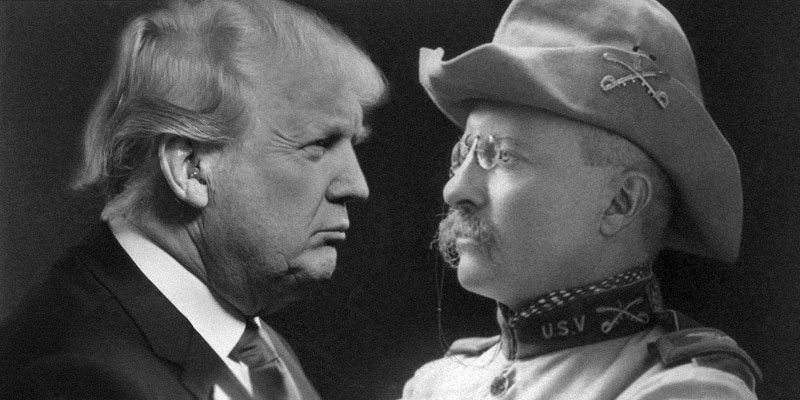
96
posted on
04/16/2024 10:55:57 AM PDT
by
BroJoeK
(future DDG 134 -- we remember)
To: BroJoeK
DL, I think we're on the same side of this one and thought you might be interested... I agree. I don't see Teddy as being the same sort of "progressive" as what came later. I think his use of government power was necessary at the time.
97
posted on
04/16/2024 12:01:42 PM PDT
by
DiogenesLamp
("of parents owing allegiance to no other sovereignty.")
To: BroJoeK
https://yellowhammernews.com/wp-content/uploads/2017/12/Donald-Trump-Teddy-Roosevelt.jpg I have often thought that Trump's actions resembles Teddy Roosevelt's more so than any other president.
They are the most alike.
98
posted on
04/16/2024 12:03:45 PM PDT
by
DiogenesLamp
("of parents owing allegiance to no other sovereignty.")
To: gibsonguy
They always show TR’s portrait on ‘’Blue Bloods.’’ He was a former NYC police commissioner.
To: BroJoeK
Don’t get me wrong-I agree completely with the abhorrence and rejection of judging people who lived centuries ago by the standards of today, with some exceptions, mostly along things you might find in the Ten Commandments.
I believe in judging people by their times, not by today’s standards. My views on T. Roosevelt have changed, not because of changing values, but my own changing knowledge of various issues as I age, such as economics or Constitutional issues. Until I began to learn more about T. Roosevelt, I was at the complete mercy of what I had been taught and what culture deigned to show me.
So I changed in my knowledge base, and that changed my views.
Related to this, I did not make any comments on the eugenics observation, because a lot of people believed in eugenics back then, for good or bad, and won’t pillory them on that unless they show themselves to be absolute racists in specific writing. It is pretty obvious that a lot of people looked at eugenics back then along the same lines they would have viewed livestock.
They lose sight of the fact that humans are humans, not livestock, and you can’t just put down or butcher and eat the ones who don’t live up to your standards.
However, I absolutely do not have any issue judging people on economic policies they embarked on, since there were people then who knew well the effects of government meddling in business, and Theodore Roosevelt took that to a new level, so I have not hesitated to judge him on those things. And his cousin, Franklin Roosevelt, I judge far more harshly in that respect. Plus, we are feeling the effects of their actions to this very day.
I do reserve the observation that situations in certain economic pathways may have been untrod back then and thus new ground. But that is not a foreground application of the criticism.
100
posted on
04/16/2024 12:53:29 PM PDT
by
rlmorel
(In Today's Democrat America, The $5 Dollar Bill is the New $1 Dollar Bill.)
Navigation: use the links below to view more comments.
first previous 1-20 ... 41-60, 61-80, 81-100, 101-106 next last
Disclaimer:
Opinions posted on Free Republic are those of the individual
posters and do not necessarily represent the opinion of Free Republic or its
management. All materials posted herein are protected by copyright law and the
exemption for fair use of copyrighted works.
FreeRepublic.com is powered by software copyright 2000-2008 John Robinson
 Hmmmmm... I'm starting to understand that there is a serious bug up some people's hindquarters to paint Teddy Roosevelt with the same "Progressive" brush as Woodrow Wilson, and yet I'm most reluctant to grant that they were just two peas in the same Progressive pod.
Hmmmmm... I'm starting to understand that there is a serious bug up some people's hindquarters to paint Teddy Roosevelt with the same "Progressive" brush as Woodrow Wilson, and yet I'm most reluctant to grant that they were just two peas in the same Progressive pod. Take, for example, the 16th Amendment -- Federal income taxes, on this thread blamed on Teddy Roosevelt, and yet:
Take, for example, the 16th Amendment -- Federal income taxes, on this thread blamed on Teddy Roosevelt, and yet: 

 My answer is, I don't think TR could have imagined what FDR would do with the progressive reforms TR supported.
My answer is, I don't think TR could have imagined what FDR would do with the progressive reforms TR supported.



 Sorry, but no, what the Progressive "Bull Moose" Party platform proposed in 1912 was nothing remotely resembling what we today consider "universal healthcare".
Sorry, but no, what the Progressive "Bull Moose" Party platform proposed in 1912 was nothing remotely resembling what we today consider "universal healthcare".
 There's no doubt that ideas related to eugenics swept the world, from roughly 1890 to 1930, after which both the facts of science and evils inherent in human nature began to discredit assumptions underlying the word "eugenics".
There's no doubt that ideas related to eugenics swept the world, from roughly 1890 to 1930, after which both the facts of science and evils inherent in human nature began to discredit assumptions underlying the word "eugenics".